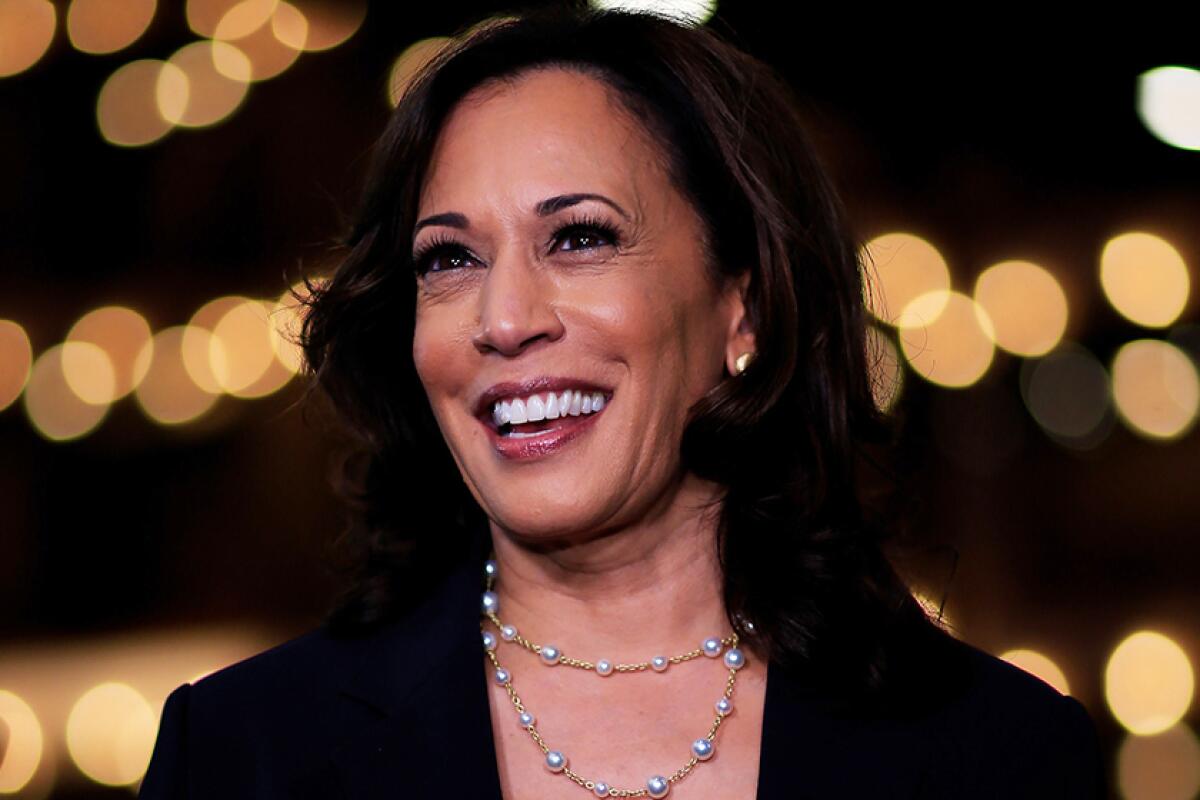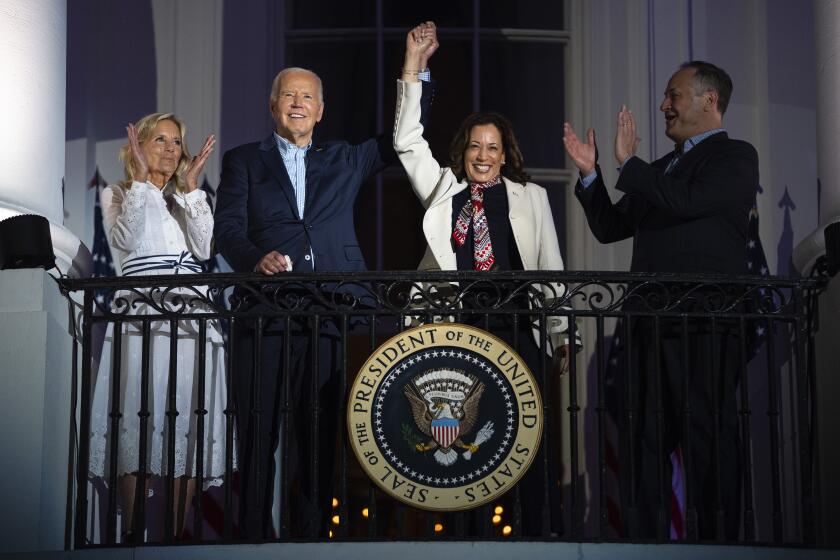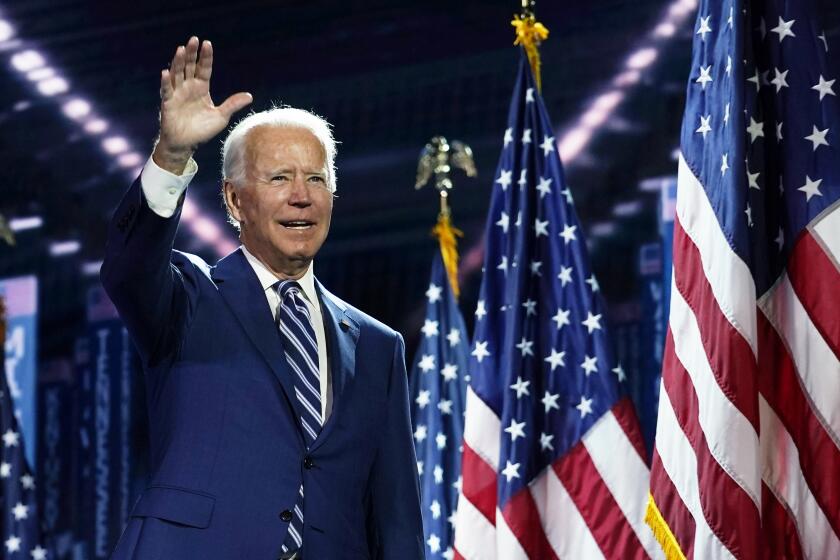Biden just dropped out and endorsed Harris. What happens now?

President Biden has ended his bid for reelection and endorsed Vice President Kamala Harris to take over the top of the ticket as the Democratic Party’s new nominee.
But with the election less than four months away, what happens next? Here’s what we know.
President Biden announces that he will step aside, opening a path for a new Democratic presidential nominee.
Is Harris automatically the next Democratic nominee?
No.
Moments after he announced in a letter to the American people that he was dropping out, Biden sent a second message giving Harris his “full support and endorsement.”
Even so, the nominee must be chosen by the party. Harris acknowledged as much in a statement, saying she intends to “earn and win this nomination.”
Through his wins in Democratic primaries and caucuses in U.S. states and territories, Biden amassed nearly 4,000 party delegates who were pledged to vote for him to be the party nominee at the Democratic National Convention, which is scheduled to begin Aug. 19 in Chicago.
President Biden’s decision to bow out of the November election leaves a path for Vice President Kamala Harris to replace him that would have seemed unlikely for most of the last three years.
His departure from the race means those delegates are now free to pick another candidate. They are not pledged to Harris.
Choosing a new nominee will be their primary task at the convention.
Jaime Harrison, the party’s chair, said in a statement Sunday that “the work that we must do now, while unprecedented, is clear.”
Harrison said the party will “undertake a transparent and orderly process” to select a new candidate that “will be governed by established rules and procedures of the Party.”
He said the party would provide more information about “next steps and the path forward” in “short order.”
How will Democratic National Convention work now?
Alice Travis Germond, who served as secretary of the Democratic National Committee for years, said that although delegates will now be “free to vote their conscience,” they will also be under huge amounts of pressure from party influencers, state governors and advocacy groups.
Such party stalwarts “have tremendous sway over the delegates” and will have their own feelings about who the next nominee should be, Germond said.
Amy K. Dacey, executive director of the Sine Institute of Policy & Politics at American University and former chief executive of the Democratic National Committee, said a candidate can lock up the party’s nomination with a simple majority of pledged delegates — more than 1,900 — voting for them on the first round of ballots.
Dacey said she was watching closely to see if party officials and other political influencers rally around Harris.
“All those individuals who called for Biden to step down — are they going to use their voice now to say they are supporting Harris, or that they are waiting?” she said.
Get the L.A. Times Politics newsletter
Deeply reported insights into legislation, politics and policy from Sacramento, Washington and beyond. In your inbox three times per week.
You may occasionally receive promotional content from the Los Angeles Times.
If Harris locks up a substantial amount of support quickly, the process ahead would be pretty straightforward, Dacey said.
However, if other would-be nominees step forward, today’s open convention could also turn into a contested convention.
Under this scenario, a candidate would have to show that they have support from at least 300 delegates to get their name on a convention ballot, Dacey said. Anyone interested in being nominated now has a small window to garner such support — and is probably already putting feelers out to delegates.
If more than one candidate does come forward, she said, the convention “becomes a sort of mini-primary.”
What will California’s role be?
Serious candidates will be trying to lock down support, especially from big delegations, and California, with 496 delegates, is the party’s largest.
Harris’ team is no doubt doing such outreach with large delegations and other delegates previously pledged to Biden. “This becomes a little bit of a campaign for the vice president,” Dacey said.
Rusty Hicks, chair of the California Democratic Party, sent a message to California delegates Sunday calling on them to back Harris.
“I am asking delegates from our great state of California and home to our Vice President, Kamala Harris, to officially endorse her nomination for President of the United States at the convention in Chicago,” Hicks wrote, before including a link to a form for them to fill out to register such support.
If Biden steps aside before the DNC in August, California’s 496-person delegation — the largest in the country — would play a key role in picking the nominee.
What is a superdelegate?
There is another type of delegate as well, and that is superdelegates — elected Democrats and officials from around the country. In other words: party insiders.
There’s about 700 of them — including Biden himself. They are also not bound to any candidate.
Superdelegates are not allowed to vote on the first ballot to nominate a Democratic presidential candidate, unless it is determined that one candidate has an absolute majority of pledged delegates behind them. Biden would have had that, but it’s less likely that Harris or some other candidate will.
Again, Dacey said she will be watching to see if party insiders and superdelegates start lining up behind Harris.
They could have substantial influence on how the process plays out from here, especially if they appear unified.
“Is there a coalescing that’s going to happen among the superdelegates?” Dacey said.
Paul Weich, a writer and lawyer from Arizona — and a delegate — said he thinks Harris will give the Democratic Party a much better chance of winning swing states — including his own.
“I’m proud to be a Biden-Harris delegate today. Today I become a Harris-whoever delegate,” Weich said. “Every political junkie always wants an open convention, and I’ve always been one of those as well. But I think that it’s a clear choice that at this point … Kamala Harris needs to be the nominee, and I don’t think it will be a wide open convention.”
What happens after the convention?
Once the party has selected its candidate, that person will square off against former President Trump in November.
Republicans have signaled that they will challenge the Democrats’ decision to replace Biden at this late stage, based in part on Biden having been the victor in the state primaries.
“Every state has its own system, and in some of these, it’s not possible to simply just switch out a candidate,” House Speaker Mike Johnson said Sunday on ABC’s “This Week.”
Dacey said that argument is baseless — and a loser legally.
Vice President Kamala Harris, if she wins the nomination, will have big challenges in starting a presidential campaign, a process that normally takes months.
While Biden was the party’s presumptive nominee before Sunday, he was never formally nominated, she said — just like Trump was not the formal Republican nominee until that party’s convention last week.
Democrats are “going into the convention trying to figure out who is the Democratic nominee, who will appear on the ballot,” Dacey said. It is “the regular process” and exactly what the Republican Party just did.
“There is nothing for them to contest,” she said.
More to Read
Get the L.A. Times Politics newsletter
Deeply reported insights into legislation, politics and policy from Sacramento, Washington and beyond. In your inbox three times per week.
You may occasionally receive promotional content from the Los Angeles Times.

















